With each Mentatrix, we take a look at the world outside, and learn more about the world inside.
We’re entering the darkest time of the year, but hiking the Black Forest trails can be just as much fun as in the summer vacation.
One of the things that are unaffected by the seasons are the drinks stations. They are usually placed along the trail, far off from any inn or resort, but other times they are on a farm’s grounds.
They come in various shapes, sizes, and fittings.

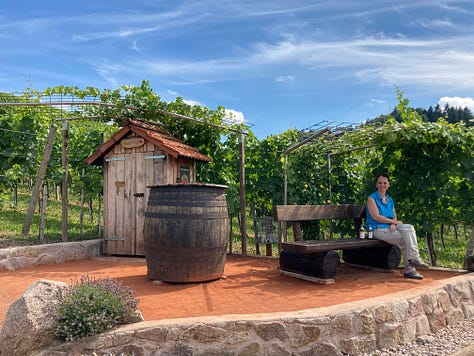
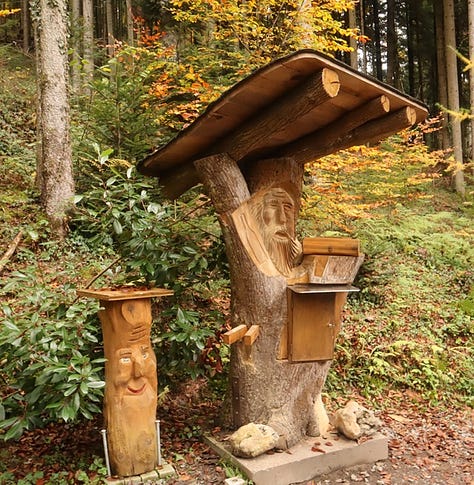
Mostly, you can find water, sodas, beer and schnapps, but there are stations offering schnapps only. That’s because Middle Black Forest is home to over 1000 schnapps distillers. One village alone, Oberkirch, counts about 800 home distilleries, with 21000 inhabitants in total.
By schnapps I mean both the clear, strong spirits and the sweeter fruit-based liquors. One distiller in Oberkirch has over twenty sorts on offer: the hiker goes along the trail, and in a small wooden box hanging on a tree trunk there’s a labelled bottle: cherry, pear, apple, quince, topinambur, raspberry, blackberry, plum, apricot – and the hiker keeps going from one tree to the next and to the next.
Sometimes you may also find home baked cake, Schwarzwälder ham, or peanuts and chocolate bars.
The beverage stations can be called in a dozen ways, from “drinks hut”, “schnapps hut”, “schnapps fountain”, “beverage station”, to “thirst quencher” or “refill station”.
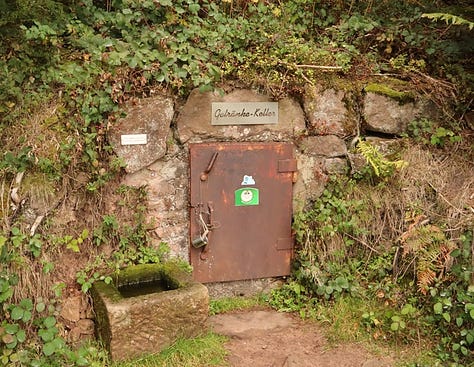
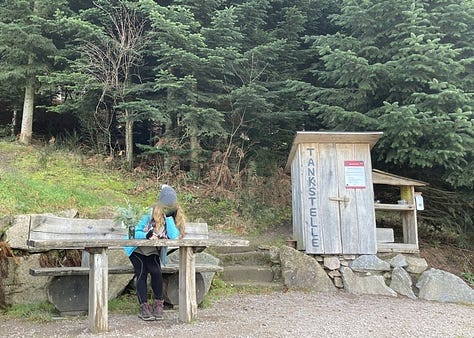
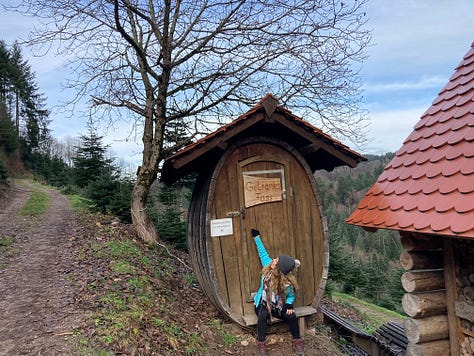
Payment is based on trust. A schnapps glass is about 1.50 euro, a soda bottle 2 euro.
In summer, water and beer are kept cool in spring water. Other stations have fridges. Although from the outside, it’s still the rustic appearances that are kept: if there’s a fridge, it will be inside a wooden hut that tends to look more like a tool shed, or a back-to-the-nature loo, than a beverage self-service point.
In this part of the Black Forest there are even schnapps trails, although technically they are often schnapps-wine-and-beer trails, given the rich tradition on the outskirts to the Rhine river. On such a trail, the hiker gets to stop at several stations, which are run by different producers. Imagine: in summer, you get a new refreshment every few kilometres; in winter, you warm your cheeks and toes before moving on, wondering what flavour you’ll be trying out next.
Needless to say, I love these refill stations. Not a big fan of wine, beer, or sweet liquor – but then, it’s not so much about what you normally drink, it’s about the rounded experience. Having a glass or bottle of something enjoying the view, on the edge of a meadow, above a green valley, on a bench by the footpath within the forest. Not sitting in a restaurant, not even in a beer garden. But out there: you, your backpack, and the bottle you hold in your hands. You drink it out, you drop the coin in the little box, and move on saying “thank you!”
There are many possible takeaways from this short story. Choose your own:
Experiences are most powerful when they involve our senses
Your eyes wander over the views, your heart is beating faster with the strain of the hike, your ears hear the rustle of the wind in the trees, or the gurgle of the tiny creek – and a bonus: you quench your thirst, cool down or warm your guts, and relish a prickly taste. Life can be that basic. Grounded. And if you’re taking the hike in company, there are no better laughs than when you explore the contents of the quaint little schnapps hut. The more tastes you try out, the more fun. You’ll always have a clear memory of what that trail was like.
So if we’re out to help people, by guiding, supporting, healing, teaching, how could we take our stories down to the basics, to the primary senses, to make the story stick?
To help bring about that change our students, patients, clients, friends are searching for.
Trust versus policing
I was at first struck by the trust involved in expecting people to count their servings, work out how much they owe, and then drop the right amount in the cash box. No cameras, of course. No one’s watching. From the other part of the world, where you come from on this hike, there are people who dine and dash, blow up cash dispensers, or simply snatch what they want casually passing by. Theoretically, you could load the contents of the refill stations into your rucksacks without leaving a dime; or, you could take the little cash box with you, even if it may need a bit of tinkering (you’d know what tool to bring along next time).
But if such things happened, the farmers would no longer keep the huts. Trust must be working.
Would it be too far-fetched to claim that it works better than cameras?
Could we set ourselves free, from time to time, from disclaimers and clauses to cover for any possible scenario-going-wrong – and simply give us permission to trust, and to hope that trust can do the work?
Placing yourself out there, at the point of need, instead of trying to dump your offer on every potential customer
Try to sell me any alcohol and I’ll say pass without even hesitating.
What the refill stations do, by contrast, is they are out there at the point of need. There’s no shop; there’s no selling. It’s just the hiker being tired, hot and thirsty, and most of all, happy to fumble through a wooden hut filled with goodies. The huts are there, in the real-life context when you need them.
If we could do the same with everything we want to offer (our creative work, our talents, our love, our wisdom): instead of dumping it on the intended recipient, put it out there where they come across it at the right moment on their paths, where it may answer their need.
The return to simplicity
I think the rustic character of these huts might be a message that some things are best unsophisticated. Thirsty? Here’s the shelf of bottles, kept cool in the rock or in the mountain water. The more rustic, the more vivid the experience. Unmediated by steel, glass, and fancy buttons. You won’t remember the fridge; but you’ll certainly remember the wooden closet filled with bottles, like grandma’s old pantry, where you stood and had a laugh, already tipsy with the three-four-who counted flavours you’d tried.
An experience of the senses is best done without frills.
So if we’re keen to charm, impress, win over, how minimalistic would we need to go? How honest would we need to be, and bare our hands and hearts to keep our message clear?
You might be curious to check this map of schnapps stations in the Black Forest: apparently there are 135 recorded here, but there should actually be much more, if they don’t offer schnapps.


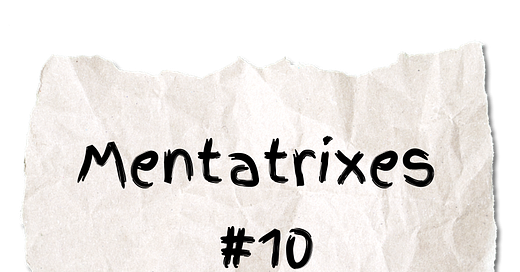




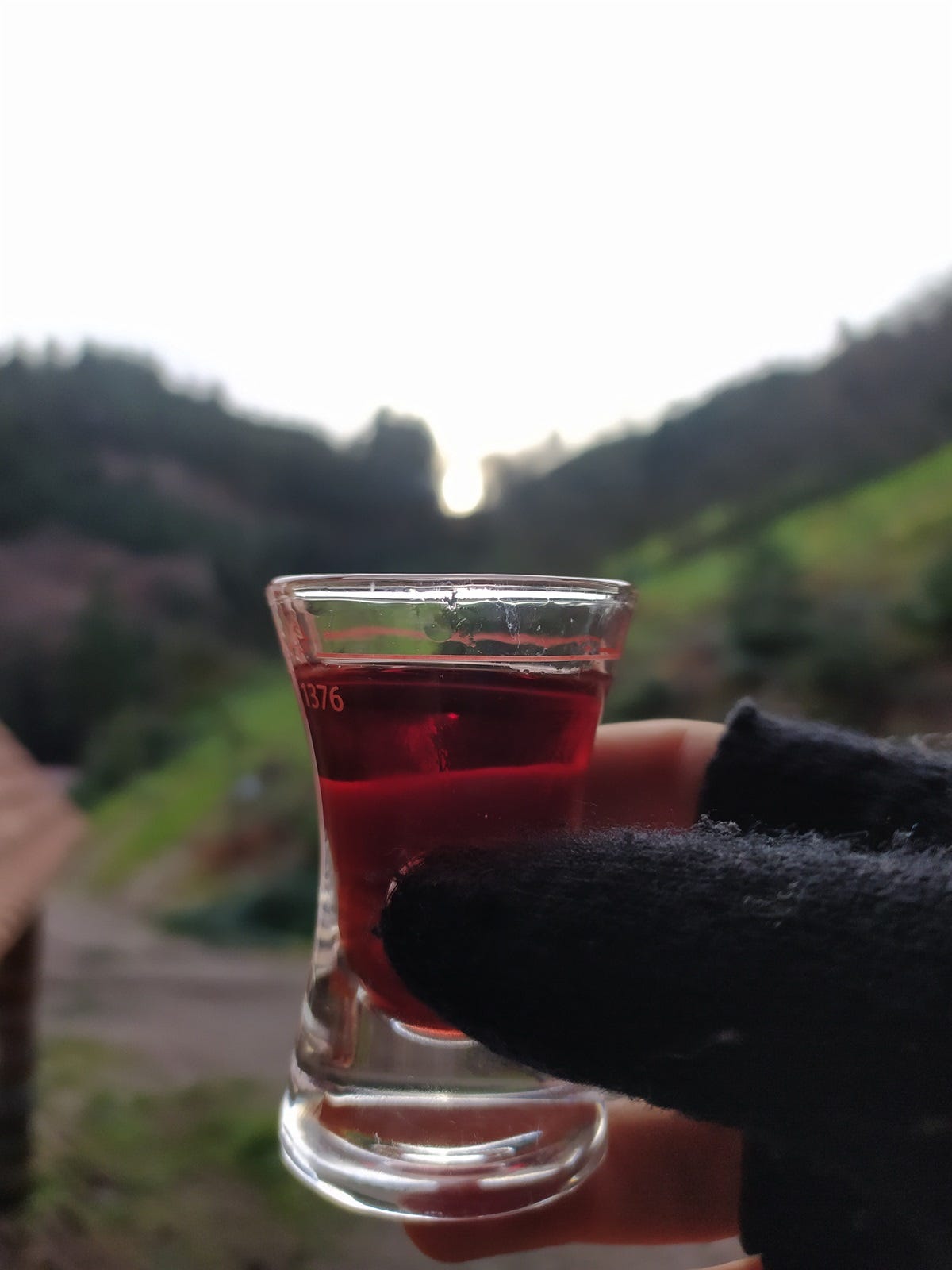



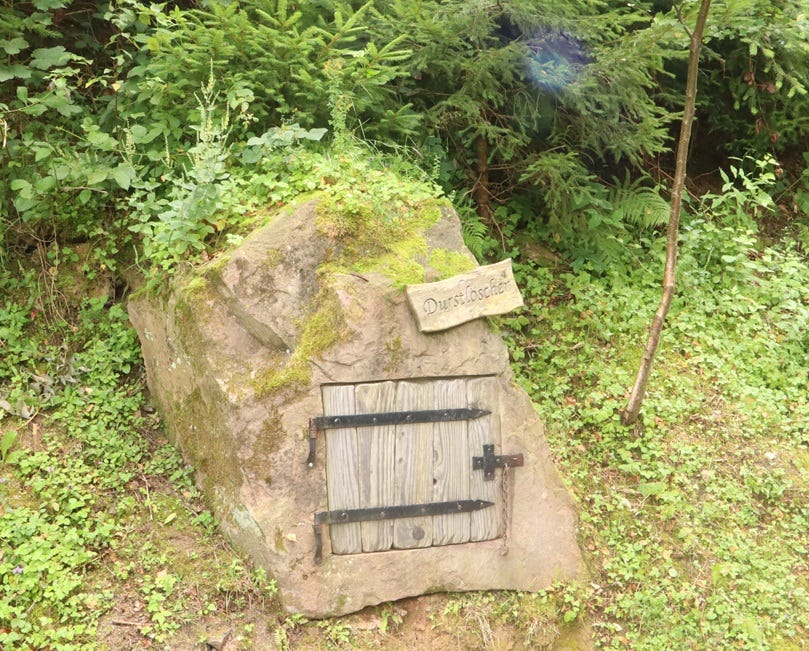
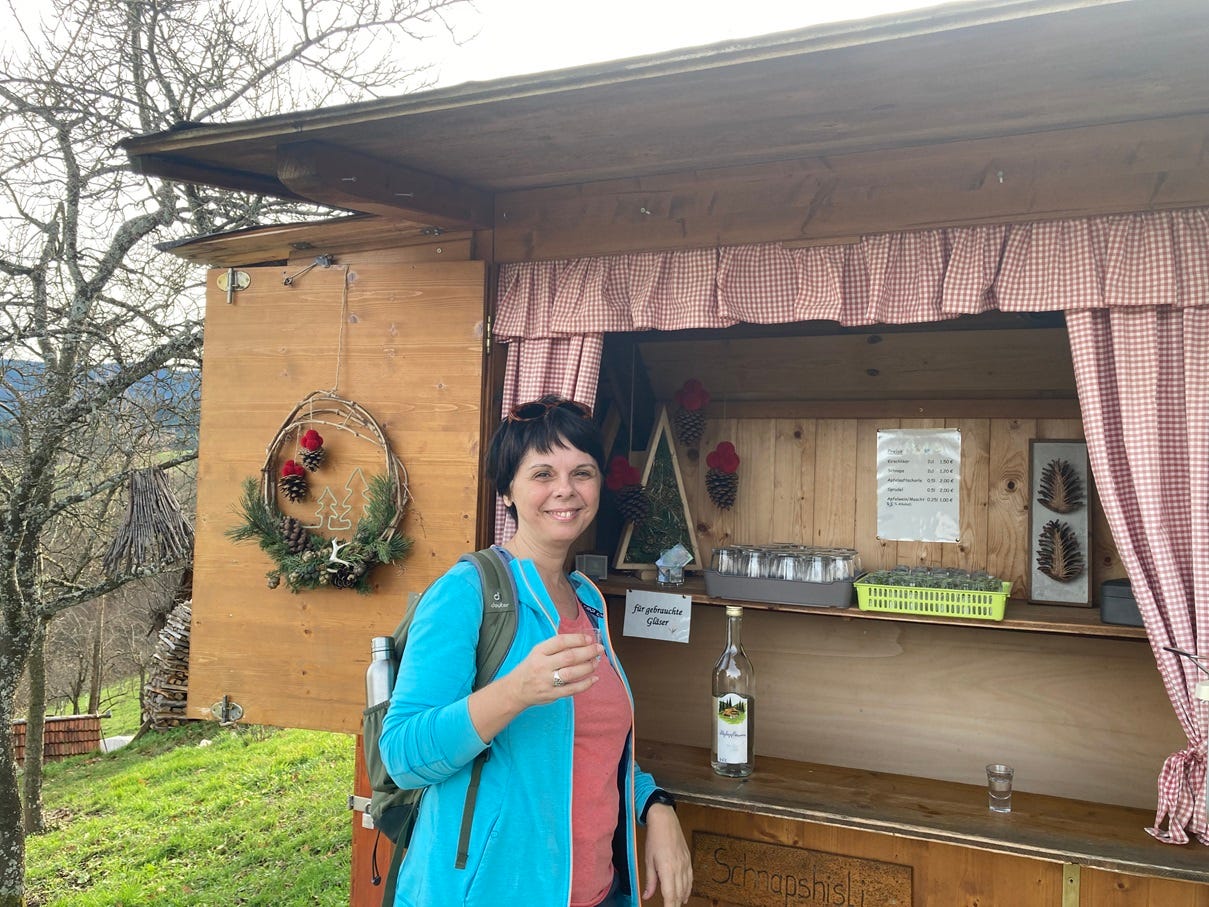

Zoe, this is wonderful, and I think all the takeaways are valid and "felt,' but I think the one that most resonates for me is a return to simplicity. We've made our lives so complicated, and we would be better off if we could scale it back.
I also identify with the issue of "trust." I wish we could live in a time where we trusted people would do right by us. I've had moments of that experience, and whenever I have it, I truly value it.
And for sure, any experience that involves our senses has a much more lasting impact on us.
You have spun a beautiful and thought provoking tale. Well done.